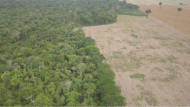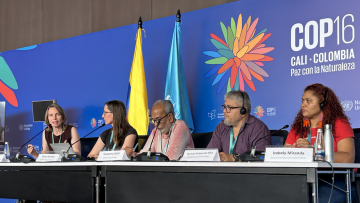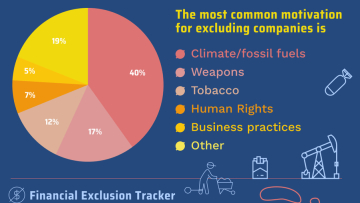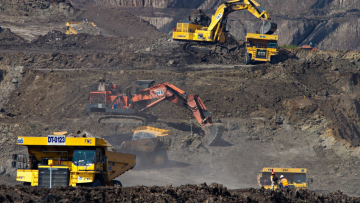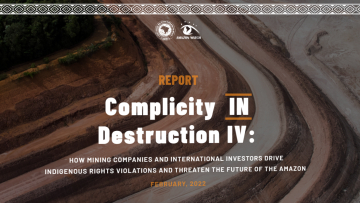
Company – On record
This profile is no longer actively maintained, with the information now possibly out of dateBankTrack
Giulia Barbos, giulia@banktrack.org

Company – On record
This profile is no longer actively maintained, with the information now possibly out of dateBankTrack
Giulia Barbos, giulia@banktrack.org
Why this profile?
Vale has a decades-long reputation for corporate malfeasance, marked by numerous environmental disasters and human rights violations globally. From the deadly Mariana dam collapse in 2015 to the devastating Brumadinho dam collapse, which killed 272 people in 2019, its operations in Brazil, Indonesia, Mozambique and beyond have been connected to loss of life, land dispossession, labour abuses and environmental harms.
What must happen
Banks and other financial institutions providing credit or investing in Vale must demand that the company adhere to international environmental and human rights standards. They must urge Vale to enhance its safety protocols to prevent future disasters, ensuring that Vale’s operations never again endanger lives or harm the environment irreparably. Banks must use their leverage to ensure that Vale takes responsibility for those adversely impacted by its global operations and provides effective remedy for harms
| Sectors | Iron ore mining, Mining |
| Headquarters |
|
| Ownership |
listed on Bolsa de Madrid, Brazil Stock Exchange & NYSE
Vale's share holder structure can be accessed here. |
| Subsidiaries | |
| Website | https://vale.com/ |
Vale, incorporated in 1942, is the second-largest producer and extractor of iron ore and the second-largest producer of nickel in the world. The company is headquartered in Brazil, and its products are crucial in the steelmaking industry. Nickel, one of Vale's main products, is used in producing stainless steel, metal alloys, and electric vehicles. In addition to iron, iron pellets, and nickel, Vale also produces copper, metallurgical and thermal coal, potash, phosphates, manganese ore, ferroalloys, platinum group metals, gold, silver, and cobalt. The company is also involved in logistics, transporting mineral products to customers. Vale has operations in more than 20 countries in five continents.
Environmental and climate impacts
Impact on human rights and communities
Displacement, impacts on health, loss of life and livelihoods
Vale's activities have a long track record of causing community displacement and adversely affecting people's livelihoods and health.
Vale’s Moatize coal mine in Mozambique, opened in 2011, displaced more than 1,360 families who suffered from loss of livelihoods, poor housing conditions and widespread food and water insecurity. In 2019, the mine’s expansion cost nearly 4,000 brickmakers and other workers their livelihoods. Throughout the years, the mine's operations resulted in several human rights violations, which, to this day, remain unaddressed. In 2021 Vale sold its assets to Indian company Vulcan Minerals.
In 2015, a tailings dam collapse at the Samarco mine in Mariana, Minas Gerais, Brazil, unleashed about 60 million cubic metres of wastewater, which killed 19 people, destroyed 600 homes and affected the lives of hundreds of thousands more within minutes. Nine years later, affected communities are still experiencing adverse impacts on their livelihoods and health as diseases such as cancer and diabetes are on the rise.
In 2019, another catastrophic tailings dam collapse occurred at the Córrego do Feijão iron ore mine in Brumadinho, Minas Gerais, Brazil. Nearly 12 million cubic metres of toxic waste cascaded through local communities resulting in 272 people losing their lives. Indigenous groups were particularly affected, with the Pataxó and Pataxó Hã-hã-hãe Indigenous communities losing their traditional livelihoods due to unfishable rivers and soil contamination by heavy metals. This also resulted in increasing health issues such as diabetes, intoxication and allergies.
For the construction of its S11D, or Serra Sul, iron ore mine in Serra dos Carajás, Pará, Brazil – a project recognised as one of the largest iron ore mines globally and operational since 2016 – Vale displaced around 200 families. Local communities were forcibly evicted, and their plantations destroyed. Additionally, the mine connects to the Carajás Railroad to facilitate iron ore transportation, spanning 27 municipalities in Pará and Maranhão. Communities are affected by both the mine’s operations and the railway, and health problems, loss of life and livestock have been reported.
For over five decades, the operations of the Sorowako nickel mine in South Sulawesi, Indonesia, where Vale holds a 43.34% interest through PT Vale Indonesia, have resulted in displacements and loss of livelihoods for local communities, including Indigenous peoples, farmers and fisherfolk. Current plans to expand the project due to increasing nickel demand have resulted in further impacts such as loss of farmland and livelihoods and lack of adequate compensation.
Lack of effective remedy and exclusion of affected communities from the decision-making process
Vale failed to fully provide effective remedy to the communities affected by the 2015 Mariana dam disaster. In 2018, academics and civil society groups, including Conectas, sent a report to the UN Working Group on Business and Human Rights highlighting Vale’s delays in providing remedy and its systematic disregard for affected communities and their rights in the remedy process. By the end of 2023, Vale paid more than USD 6 billion in compensation for loss and damages, with victims saying this was not enough. In January 2024, Vale was ordered by a Brazilian court to pay a further USD 15 billion in damages. In October 2024, Brazil's federal court reached a settlement ordering Vale and the other companies responsible for the disaster to pay USD 23 billion in reparations over a period of 20 years. This includes compensation for over 300,000 victims, though the actual number of those affected is estimated to be much higher. Affected people and their representatives were unable to take part in the negotiations, and consider the agreed reparations as insuffcient. Affected individuals, workers, Indigenous groups and other stakeholders are still seeking remedy for harm by suing Vale in jurisdictions including Brazil, the Netherlands and the UK.
Despite Vale pledging to provide remedy for the 2019 Brumadinho dam disaster, and entering into a USD 7 billion settlement agreement with the government of Minas Gerais, the agreement excluded civil society and representatives of the affected communities. Also, the reparations paid have been largely used for infrastructure investments in the state rather than tangible remedy for the affected communities. As Vale did not fund relocation programs, affected Indigenous communities moved into slums and were forced into precarious living conditions as a result.
Vale has still not provided full remediation to communities impacted by its troubled Moatize coal mine in Mozambique, which it sold to Vulcan Minerals in April 2022. Reports on the project sale do not indicate whether either company has assumed responsibility for providing remedy, and the harmful impacts of the project persist to this day
Impacts on Indigenous land rights
Vale puts pressure on Indigenous communities by continuously seeking exploration licences to expand its operations in Indigenous territories in the Amazon. As of November 2021, Vale had 75 active mining applications for territories intersecting with Indigenous lands. These lands are home to Indigenous groups such as the Kayapó, the Xikrin, and the Parakanã peoples.
Impact on climate
Mining operations often impact on climate change, particularly when associated with deforestation and land-use change. About 58% of the carbon stock in the pan-Amazon region alone is found in Indigenous territories and protected areas. Though there are reports that Vale has provided funds to support forest conservation efforts in the Carajás region, the impacts of Vale’s operations at its S11D iron ore mine are still felt as Indigenous people are still disconnected from their land. The expansion of the railway and mining projects continue to cause forestry and biodiversity loss. In Sulawesi, Indonesia, where Vale’s Sorowako project is located, the development of captive coal plants and processing centres (for processing and refining nickel) is causing the contamination of diverse marine areas and forests with heavy metal-laden particles affecting the biodiversity necessary for carbon sinks.
While Vale reports sourcing most of its power from renewables, some of its operations remain reliant on polluting energy sources. For instance, the Carajás iron ore railway still operates on diesel power, although there are plans to decarbonise it.
Impact on nature and environment
River and water pollution
The Mariana dam disaster in 2015 released 55 to 62 million cubic metres of toxic waste into Brazil’s Doce River, contaminating croplands and vital sources of water along 650km of the waterway. The mine collapse was at the time defined as Brazil’s worst ever environmental disaster, with clean-up efforts failing to restore the river and hazardous chemicals persisting in the water for years after the incident.
The Brumadinho dam disaster in 2019 released 50 million tons of toxic wastewater into the Córrego do Feijão brook and the Paraopeba River, Minas Gerais’ major watercourse. This affected the water quality for the whole region, including contaminating fish populations with toxic pollutants resulting in public health concerns.
Vale’s operations at Onça Puma nickel mine in Brazil’s Pará state have been suspended numerous times due to pollution of the Cateté River, threatening the livelihoods of Indigenous Xikrin peoples. In 2018, Vale was ordered to pay USD 26.8 million in reparations to Indigenous groups for its role in the river’s contamination.
Vale’s activities at the Sorowako nickel mine in Indonesia have contaminated underground water sources, posing threats to local communities. Water testing conducted in October 2022 revealed that the water was contaminated with hexavalent chromium (a heavy metal) and was below the water quality standards prescribed by the World Health Organisation and the Indonesian Government. By August 2023, local organisations complained that Vale had still not provided the community with clean and potable water.
Deforestation and biodiversity loss
The Mariana dam disaster destroyed 80% of the native vegetation surrounding the Doce River. In addition, the toxic wastewater unleashed by the dam failure also heavily impacted biodiversity: 98 fish species were affected, 13 of which were unique to the Doce River, and 11 of which were already at risk of extinction. The mass fish die-off also impacted bird populations, with hundreds dying of starvation as a consequence. The impacts on biodiversity extended beyond the Doce River to the ocean, reaching as far north as the Abrolhos National Marine Park in Bahia and as far south as Rio de Janeiro state. This affected stretch encompasses one of the most ecologically diverse regions in the South Atlantic Ocean.
The Brumadinho dam disaster, according to an analysis by WWF Brazil, caused the destruction of approximately 125 hectares of forests, the equivalent of 125 soccer fields. The aquatic and terrestrial fauna in the area were also significantly affected. The S11D iron ore mine was carved out of the Carajás National Forest, part of Brazil’s rainforest, and puts at risk the canga (a type of savannah) ecosystem. Steel companies around Carajás also use massive amounts of wood fuel, requiring heavy logging and planting of non-native eucalyptus. Vale was also a significant shareholder of the problematic Belo Monte Dam project, one of the world’s largest dams on the Amazon's Xingu River. The hydroelectric mega-dam has faced fierce resistance from social movements and Indigenous peoples for over 20 years, becoming a global symbol of environmental injustice for the damage it brought to the environment and biodiversity. Despite Vale selling its rights in 2015, to this day the Belo Monte project has severe impacts on the Xingu River and the people depending on it.
Federal prosecutors in Rio de Janeiro, Brazil suspended Vale’s dredging operations at Sepetiba Bay in 2018 after 200 grey-eared dolphins died.
Other impacts
Conflicts of interest and dams safety concerns
A 2020 investigation report concluded that the Brumadinho dam disaster that killed 272 people was caused by conflicts of interest between the mining company and its auditor, Tüv Süd, faulty information-sharing within the company, and a compensation structure that prioritised financial returns. These conflicts and the poor governance within Vale led to the dams being certified despite not meeting international safety standards. Today, 27 of Vale’s tailing dams are in a dire state, and two are at risk of rupture, meaning dam safety is a real concern, as is apprehension that another mining disaster could happen again.
Lawsuits
Throughout the years, Vale has faced numerous lawsuits relating to human rights and environmental issues. Below are a few recent examples.
-
Vale has been sued numerous times regarding the 2015 Mariana dam disaster.
-
In 2016, legal proceedings were launched in Brazil, which concluded with a settlement called a Transaction and Conduct Adjustment Agreement (TTAC), whereby Vale agreed, together with BHP Billiton, to create the Renova foundation and provide compensation for damages. The companies claimed that by the end of 2023, USD 6 billion would be provided as remedy. Still, Brazil’s Federal Public Ministry concluded that the foundation was never independently audited and that there was no evidence of these figures corresponding to reality.
-
The same year, criminal proceedings were initiated against the then-CEO of Vale and 21 others who were charged with homicide. The proceedings were suspended in 2017, resulting in nobody being held criminally responsible for the disaster.
-
Also in 2016, Federal prosecutors in Brazil filed a USD 43.5 billion civil lawsuit against Vale and BHP Billiton, which resulted in a 2024 ruling for the companies to pay USD 15 billion in damages.
-
In 2018, legal action was launched in the UK against BHP and Vale. Legal proceedings are still ongoing, and this marks the largest group litigation in British history, representing over 700,000 affected individuals and amounting to over USD 44 billion in claims.
-
In March 2024, a lawsuit was launched against Vale in the Netherlands on behalf of 1,000 businesses and over 77,000 individuals hit by the disaster, posing a claim for USD 3.8 billion.
-
In October 2024, a class action lawsuit was filed in the UK on behalf of 620, 000 people affected by the Mariana dam disaster, seeking an estimated USD 47 billion in damages from BHP.
-
-
Vale has also been sued in relation to the 2019 Brumadinho disaster.
-
In 2020, Vale’s former CEO Fabio Schvartsman and 15 other people were charged with homicide over their roles in the Brumadinho disaster; however, in March 2024, criminal charges against Schvartsman were suspended.
-
In 2022, the Brazilian Comptroller General fined Vale for USD 17 million based on the Anti-Corruption Law for making it difficult for the authority to inspect the Brumadinho dam before its disastrous rupture.
-
In 2023, Vale agreed to pay USD 55.9 million to the United States Securities and Exchange Commission, which fined the company for misrepresentation and failure to disclose information related to the dam disaster.
-
-
At least two cases were brought to Vale in Mozambique over the Moatize coal mine. Friends of the Earth Mozambique and the Mozambican Bar Association each filed cases regarding access to public interest information, challenging Vale’s failure to disclose environmental monitoring reports from 2013 to 2020.
Between 2015 and 2021, Vale has been subject to litigation over the operations of its Onça Puma mine in Brazil. For example, in 2017, a court ordered Vale to stop all activities at the mine until it fulfilled legal obligations for compensating affected Indigenous communities and met environmental legal requirements. In 2019, the court ordered Vale to halt operations again until the conditions for its environmental licence had been met. Again, in 2021, Vale was ordered to halt production after the state’s environmental and sustainability office (SEMAS) notified it of the suspension of its licence.
Commercial banks are financing Vale via corporate loans:
-
A USD 2 billion credit facility from 2017 maturing in 2022 involving 18 banks;
-
A USD 3 billion credit facility from 2015 maturing in 2020, involving 24 banks. This credit facility was replaced with a new five-year credit line in December 2019 by a syndicate of 16 banks. See below for more details.
And via underwriting services (for general corporate purposes):
-
USD 1.25 billion, dated June 2016 - June 2026, involving 5 banks;
-
USD 1 billion, dated Aug 2016 - Aug 2026, involving 12 banks;
-
USD 1 billion, dated Feb 2017 - Aug 2026, involving 7 banks.
Commercial banks finance Vale via bond and shareholding (Profundo finance research, January 2024, most recent filings). See below for more details on the banks involved (listed are banks with bond and shareholding + USD 5,878.8 million).
See below for a specified overview of financial institutions involved.
An overview of Vale's finance from 2008 to 2013 can be accessed here.
Our Community. Our Resource. Our Canada.
Nosso carvão não
Não Vale
Lungs of Steel
Minério de ferro, viagem sem retorno
A peleja do povo contra o dragao de ferro - English subtitles
Vale elected world's worst corporation
2024
2024-06-07 00:00:00 | Brazil adds Vale to “dirty list” after contractor subjected workers to slave-like labour
Vale (NYSE: VALE) has been included by the Ministry of Labor and Employment in the Brazilian registry of employers who have subjected workers to conditions similar to slavery, also known as the “dirty list”. The case involves a 2015 operation at Mina do Pico in the state of Minas Gerais, in Brazil, which found 309 workers subjected to exhausting working hours, degrading conditions and were victims of fraud, misleading promises and threats. For example, a worker who drove a truck for 23 hours with only a 40-minute break, as revealed by the Repórter Brasil back in 2015. Although the workers were employed by a subcontractor, Ouro Verde, Vale was found to be responsible.
Being on the "dirty list" does not automatically lead to financial exclusion from Vale. This applies only to agricultural loans, prohibiting the granting of rural credit to those on the list, a measure enforced by the National Monetary Council since 2010. The list is also relevant tool used by Brazilian and foreign companies and banks in their risk management assessments.
2024-01-30 00:00:00 | Brazil orders Vale, BHP and Samarco to pay $9.7 bln in damages
A Brazilian federal judge has issued an order requiring Vale SA, BHP, and their joint venture Samarco to pay $9.67 billion in damages for the 2015 mining dam collapse in the city of Mariana that killed 19 people and left the Rio Doce river severely polluted. The judge stipulated that the funds are to be deposited into a state fund dedicated to projects and initiatives benefiting areas affected by the dam collapse. However, the decision is not yet final, as the companies retain the option to file an appeal (Reuters).
2019
2019-03-18 00:00:00 | Brazil court suspends operations at two more Vale dams
A Brazilian court has ordered Vale SA, the world’s largest iron ore miner, to suspend operations at two more dams, demanding that it prove the structures are stable. Vale has faced growing pressure to prove that its remaining dams are safe. The fatal disaster in the town of Brumadinho was the second of its kind in four years (Reuters).

